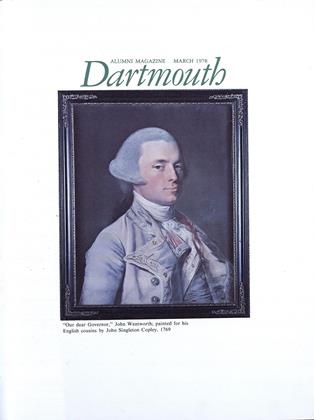Much of freshman orientation week is spent taking tests — some concerning knowledge of English or mathematics, some concerning more personal subjects. The American Council on Education and UCLA recently published the results of a test taken by the Dartmouth Class of '81, along with freshmen from 250 other four-year colleges.
The results are predictable: The Dartmouth freshmen have higher grades, different plans for the future, more liberal attitudes, and come from families with larger incomes than do most of the other students.
For example, 36 per cent of the Dartmouth freshmen, compared to 25 per cent of the freshmen from other colleges, described their political orientation as liberal. Almost 40 per cent of the Dartmouth students said their average grade in high school was A or A-plus, while only ten per cent of the others could make that claim. Thirty per cent of the Class of '81 at Dartmouth, and six per cent of the other freshmen, estimated their parents' incomes to be more than $50,000. The fathers of almost half the Dartmouth freshmen (and the mothers of 21 per cent) hold graduate degrees.
The Dartmouth freshmen trailed in some categories, however. On the average, more students from other institutions can type 40 words per minute, use a sewing machine, and bake a cake from scratch. On the other hand, more Dartmouth freshmen claimed to be able to sight-read piano music, score a tennis match, differentiate stocks and bonds, and do at least 15 pushups.
Only about two and a half per cent of the freshmen at Dartmouth and other schools said they had come to college because they had "nothing better to do."
What are their plans for the future? No freshmen at Dartmouth, and less than one per cent of the freshmen anywhere else, expect to become full-time homemakers or interior decorators. The largest group — 18 per cent at Dartmouth and 11 per cent elsewhere — are undecided about their future careers. Nine per cent of the Dartmouth students want to become business executives, 16 per cent lawyers, and 17 per cent doctors. Almost 60 per cent of all students thought that raising a family was very important.
Some objectives that the groups rated differently were: obtaining wealth (fewer students at Dartmouth than at other schools thought it was essential), developing a philosophy of life (more Dartmouth students rated it highly), and promoting racial understanding (again, more students at Dartmouth considered it a very important objective).
Although there were not any glaring variations in the answers that male and female Dartmouth freshmen gave, we were struck by the fact that more women than men earned A's in high school, more women's mothers and fathers possessed graduate degrees, fewer women thought that raising a family was essential, and fewer were in favor of casual sexual relationships.
We aren't sure how important the 15 pages of test results are, but we'd be willing to make a guess, based on our own experience, that some of the future-plans-and-aspirations questions might be answered differently by the same group when they're seniors. During four years at Dartmouth we wrote home about at least a dozen different "definite" careers and changed our major almost as many times. We also learned how to bake a cake from scratch, but we still can't score a tennis match.
 View Full Issue
View Full Issue
More From This Issue
-
 Feature
FeatureStalking the Student Athlete
March 1978 By Dan Nelson -
 Feature
FeatureThe New Classics
March 1978 By Shelby Grantham -
 Feature
FeatureNEFERTITI
March 1978 By Ray W. Smith -
 Feature
FeatureFaces in the Gallery
March 1978 -
 Article
ArticleAn Untraditional Path
March 1978 By A.E.B. -
 Books
BooksNotes on a Yale man's journal and the 'elbowing self-conceit of youth.'
March 1978 By R.H.R.







